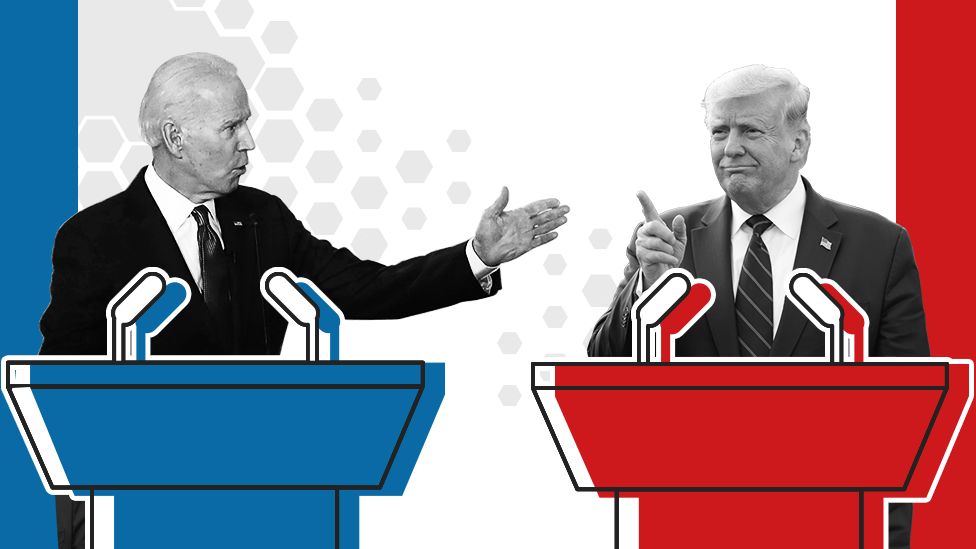US election 2020: A guide to the final presidential debate
- Published

Donald Trump and Joe Biden will share the stage on Thursday night for the final presidential debate before election day on 3 November.
A lot is at stake. For Mr Trump - whose coronavirus diagnosis derailed plans for a debate last week - it is a chance to turn around a flagging campaign as he is currently trailing in the polls. Meanwhile, Mr Biden will work to maintain his frontrunner status, hoping to avoid any gaffes or verbal stumbles.
Here's what you need to know.
When and where is the debate, and how will it work?
The debate will be held from 21:00-22:30 ET (02:00-03:30BST) at Belmont University in Nashville, Tennessee, and you can follow it live on this website.
The 90-minute debate will have no commercial breaks. It will be divided into six 15-minute segments, with each candidate given two uninterrupted minutes before they enter into open debate. Here comes the important difference from the first debate, which was filled with interruptions: during these two-minute blocks, only the candidate who has the floor will have his microphone turned on - the other will be temporarily muted. Let's see how well that works out.
The six segments will address six separate topics:
- Fighting Covid-19
- American Families
- Race in America
- Climate Change
- National Security
- Leadership
And in terms of coronavirus, safety protocols are expected to be similar to the first Trump-Biden face-off. Candidates will be spaced a safe distance apart and they will not shake hands.
The last debate was a mess. Will this one be any different?
The president is being counselled to use a softer touch this time around, after his belligerent attitude in the first debate was thought to have hurt him with suburban women, a key voting demographic. His advisers say allowing an opponent not always known for his way with words to speak uninterrupted could help his cause.
The debate commission's decision to mute the other candidate's microphone during the initial two-minute answer period might also help impose some discipline on Trump and put the pressure on Biden to provide the kind of clear, extended answers to policy questions he avoided in the last debate.
Any time Biden goes into greater detail about his positions, it risks angering various parts of his electoral coalition, made up of factions - left-wing progressives, blue-collar workers, Democratic moderates and disaffected Republicans - that have very different hopes for a Biden presidency.
Trump could very well decide he still needs to go on the attack, of course - or, in the heat of the moment, abandon his planned strategy. Biden flashed his temper two weeks ago but mostly maintained his composure and avoided serious pitfalls. In the final set-piece of a long presidential campaign, he may be tested one more time.
Pity the host.
There may not have been a clear winner in the last Trump-Biden showdown, but moderator Chris Wallace could be counted among the losers. Despite his best efforts, the veteran journalist struggled to maintain control of the evening and failed to stop Mr Trump's incessant interruptions.
This time, NBC's Kristen Welker will be in the hot seat. Before she has asked a single question, she is already under attack from the president.
"She's always been terrible & unfair, just like most of the Fake News reporters," Mr Trump tweeted on Saturday. It's a departure from what his own campaign adviser, Jason Miller, told Fox News this month - that Ms Welker would do an "excellent job" of hosting the debate.
"I have a very high opinion of Kristen Welker," he said, echoing remarks from several of her journalist colleagues, who describe the long-time White House correspondent as tough and fair.
How are the candidates preparing?
From the outside, the candidates' debate preparation looks just as different as the candidates themselves.
Former Vice-President Joe Biden seems to be hunkering down in advance of the debate. He has no public events on his schedule this week and is sending top surrogates like running-mate Kamala Harris out on the trail instead.
President Trump, on the other hand, is sticking to his typical schedule, hosting large rallies across the country. In the days before the debate, he'll hopscotch between live events in Arizona, Pennsylvania and North Carolina.
Did the first debate change anyone's mind?
Maybe. According to voter surveys before and after the first debate by polling website FiveThirtyEight and Ipsos, voters reported a slight decline in support for Trump, and a slight boost for Biden. And in the days after the face-off, the former vice-president gained some ground in national polls, widening his lead by about three percentage points.
Still, debates are typically targeted at voters who have not yet made up their minds, and there don't seem to be many of them left. A recent Reuters/Ipsos poll found that just 8% of likely voters are still on the fence about who they want as president.
- Published28 October 2020
- Published1 October 2020
- Published8 October 2020
- Published25 September 2020